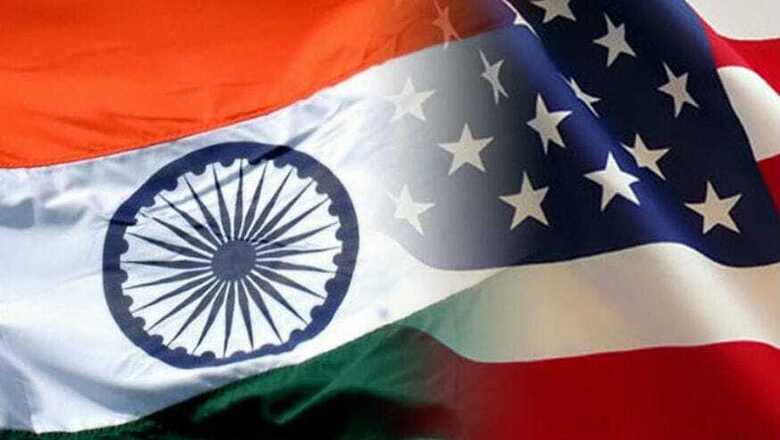
views
Students from developing nations congregate in the States in the hope of a better life for themselves and others.
New York- The United States of America, even today, is viewed as the land of opportunity by people all across the world.
Students from developing nations congregate in the States in the hope of a better life for themselves and others.
Fortunately, over the past two decades the proportion of Indian students hoping to learn essential skills in the USA and thereafter utilizing the skills gained for the benefit of those back home in India have increased.
Yet, there is still a vast proportion of Indian student population ranging from undergraduates to those pursuing doctorates, who look forward to making a career in this new nation itself.
Indeed, this nation accepts Indian students with open arms as they form a source of a stable and skilled middle class here and it is therefore no surprise that the number of students of Indian origin in the US are constantly on the rise, increasing from 148,360 in March 2015 to 194,438 in March 2016, ie. – by 31.1% as per SEVIS records.
For both the categories of Indian students who set foot in the USA – those who wish to settle in this country and those who want to go back to India – although in varying proportions, the US Presidential election of 2016 is a source of dispassionate entertainment, reasonable concern and cultural shock all at the same time.
From following Presidential debates, to policy papers and for those even watching House of Cards, the US presidential election opens the gateway for the first time, to the magnificent and chaotic phenomenon that politics is.
Dispassionate entertainment it is for those who see themselves unable or unwilling to settle in the USA and take the whole election process for its entertainment value.
Every now and then it does not fail to provide a common issue to talk about and mingle with others. At the same time, for some, it offers raw material to indulge in a bit of “schadenfreude” – a sense of pleasure in the pain of others.
That a superpower like the USA has come to a point where a candidate has emerged who manages to so articulately offend so many, in contradiction to any Human Rights or even the Constitution of the USA, is a confirmation of the fact that not everything is right about this nation.
It is an election of reasonable concern too, especially for those who seek to settle in the USA and consider their destiny hinging upon the policies of the candidate who wins the elections.
While on one hand Diwali was celebrated in the White House by a Democratic President, on the other the Republican nominee too is leaving no stone unturned to pander to the Indian masses who influence the US elections or have become citizens here and exercise thereby, their voting rights.
Behind the sublime assurance that both the competing parties are, in their own way, desirous of gaining support of the Indian community, yet the Indian student feels reasonably anxious owing to the xenophobic rhetoric of the Republican candidate admixed with his often contradictory and shifting statements ranging from appreciating the Indian government in TV ads to making fun of the Indian accent in a frivolous, yet derogatory manner.
Whether paranoia or not, a looming concern of cancelled scholarships, grants and fellowships weighs heavily in the minds of the Indian and indeed most of the international students, should a xenophobic President take office.
For both sets of Indian students - those who are politically well versed and those who have hitherto been completely insulated from political events and happenings - this election is one cultural shock too.
It is indeed difficult for an Indian student to fathom as to why an issue so seemingly irrelevant as using a personal email address for official work become a pain in the neck for Hillary Clinton.
Anyone with even a cursory understanding of the governmental system and bureaucracy in India realizes that right from a Supreme Court Judge or a Chief Minister, to a municipality clerk, there is a fair chance that either the official may have no email ID in the first place, or a generic one with a gmail or a yahoo address, and if at all they do and are aware of an official email account, the chances of usage of the same, even for official work are close to zero.
But since the Indian government is functioning anyway, why make such a fuss about email IDs? While many of the Indian students do fathom cyber security risks, yet appreciating the fact that it could be turned into such a massive election agenda is beyond an Indian student’s understanding.
For those well versed with the electoral process, the sheer size of expenditure on the campaigning comes as a cultural shock and more so when they witness the incendiary negative campaign advertisements in the USA – something still banned in India.
Clearly, the Indian student community as of now, sees the democratic candidate as a safer choice for their future owing to her consistent stance and the Democratic party’s values of inclusiveness. Hillary Clinton’s moderately conservative, yet open minded personality also puts the Indian student at ease.
On the other hand, while traditionally a large proportion of the Indian community in the USA has been Republican party’s supporters – which has returned a number of mayors, congressmen and governors of Indian origin – the reckless presence of Donald Trump, with his “locker room conversations” puts even the most non-judgmental Indians at unease.
Whatever be the case, it is not an uncommon sight to find Indian students actively participating in political debates on American campuses with people from all around the world, taking this campaign as a reference point to understand the deeper nature of politics and the political process.
Indeed, they do see it as a window to understand as to what might happen in India someday as its political process becomes more assimilative of the American campaigning styles.
Whichever party that an Indian student be inclined towards, whether Republican or Democrat, it is certainly heartening to witness students from the Indian community enthusiastically watching Presidential debates in their University halls or the nearest pubs and actively engaging with the political discourse of the USA.
(Arpit Chaturvedi is a Master of Public Administration Fellow at Cornell University.)















Comments
0 comment